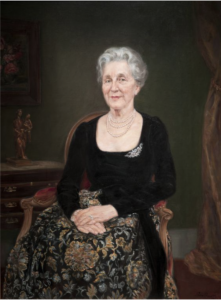
Photo info ...
Credit: Public domain via NewfieldsView Source
(Sept. 21, 1885-May 22, 1968). Philanthropist and patron of the arts, Edith Whitehill Hinkel was born in Buffalo, New York, to Dr. Frank W. and Kate (Campbell) Hinkel. She graduated in the first class of the Franklin School, a new progressive preparatory school, in 1903. She attended Vassar College for two years. She married in Ipswich, England, in 1910. Their first son, Alexander Temple Clowes, died in childhood. With their two younger sons, George H. A. Clowes Jr. and , the couple moved from Buffalo to Indianapolis in 1919 when her husband took a research position at .
Clowes cofounded the in 1922, with pedagogy similar to the Franklin School that emphasized individual instruction and children’s creativity. She served twice as board president in the 1920s. She also served on the board of the Family Welfare Society ( ) until 1947. Beginning in 1950, she served on the board of the Maternal Health League of Indianapolis (), which worked to reduce maternal and infant mortality and prevent criminal abortions.
The Clowes belonged to the Church of the Advent. In 1949, the family spearheaded the design and fundraising for the creation of a new building, Trinity Episcopal Church, and influenced its English country style. The couple toured East Anglican country churches to gather designs and Edith chaired the Women’s Advisory Committee for the project. The cornerstone was laid in 1951; the church was consecrated in 1953.
An ardent horticulturist, Clowes was famous for her gardens at Westerly, the couple’s Indianapolis home, and Easterly, their Woods Hole, Massachusetts, home. In 1959, she won the Massachusetts Horticultural Society bronze medal for her “scallop shell” garden in Woods Hole. She initiated the Park School () House and Garden Tour in 1935.
George Clowes, was a lifelong collector of fine art. In 1952, the family established the to protect the family’s collection of European Old Masters, known as the Clowes Collection. Before its transfer to the in 1971, Edith gave personally curated tours of the collection at Westerly. IMA erected its Clowes Pavilion to put it on display. The Clowes Fund has gradually transferred ownership of the Clowes Collection to the museum. This transfer was completed in 2020.
After George’s death in 1958, Edith and her sons provided considerable support through the Clowes Fund for the building of on the campus. She received an honorary degree, Doctor of Humane Letters, from Butler in 1962 and was named “Woman of the Year” by the in 1964.

Help improve this entry
Contribute information, offer corrections, suggest images.
You can also recommend new entries related to this topic.